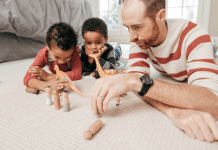Ask my seven-year-old son about the latest Dog Man book he’s reading and he will list every semi-inappropriate joke the series has to offer. Inquire about the most recent episode of Transformers Rescue Bots and he will go on for an hour about the characters, plot twists and “bad guys.” Question him about his school day, and the answer will always be, “good.” No more, no less. I have wondered if it’s a boy thing, or perhaps an introvert’s tendency. But after talking with other parents, I’ve concluded it is actually just a kid thing!
They have been sitting, concentrating, and acting appropriately for a solid seven hours, and the last thing they want to do is deal with a peppering of mundane inquiries. I can relate! Who doesn’t have those same feelings after a long day of work?
 Why is it so important to know the details of the school day? My son will ask this repeatedly when I fire off the questions. There are several reasons. One being, I missed him while he was away, and I think it is extremely important to connect with each other on a regular basis, minute as the specifics may be. During the school year, they spend more time with their classmates and teachers than they do with us! Second, understanding their social and emotional state-of-mind at school can give insight in to any positive or negative interactions they may be experiencing. Knowing if they are sitting alone at lunch, feeling isolated, or being bullied early may help to ward off terrible situations that we, as parents, do not even want to imagine. Most importantly, it is my job to ensure I am promoting a healthy and positive environment for them to thrive within, and if they are not experiencing that same type of atmosphere in a school setting, we need to know why and what can be done to improve the situation.
Why is it so important to know the details of the school day? My son will ask this repeatedly when I fire off the questions. There are several reasons. One being, I missed him while he was away, and I think it is extremely important to connect with each other on a regular basis, minute as the specifics may be. During the school year, they spend more time with their classmates and teachers than they do with us! Second, understanding their social and emotional state-of-mind at school can give insight in to any positive or negative interactions they may be experiencing. Knowing if they are sitting alone at lunch, feeling isolated, or being bullied early may help to ward off terrible situations that we, as parents, do not even want to imagine. Most importantly, it is my job to ensure I am promoting a healthy and positive environment for them to thrive within, and if they are not experiencing that same type of atmosphere in a school setting, we need to know why and what can be done to improve the situation.
After some very non-scientific research, trial and error conversations, and asking fellow moms, veteran moms, school counselors, teachers, and grandmas (who are also former educators), I’ve compiled a list of advice they (and I) believe can help foster positive exchanges to get kids talking.
Ways to approach them in a non-threatening (read: annoying or pestering) manner:
- Avoid asking questions as soon as they walk in the door, or on the walk/drive home. It is so very tempting to barrage them the minute you see them. My son has endlessly complained about this approach. Ask your child what time of day would be the best for them to want to open up. For him, he likes to lay in bed together, without the distractions of siblings, after the lights are out. I’ve found he will spill his guts about anything and everything at this time of night. It feels the most safe to him.
- Allow them relax or run some energy out, and save the discussion for the dinner table where everyone can contribute and interact.
- Start by detailing your day! No matter your profession, tell them the most insignificant parts and interject humorous outtakes (even if you have to make something up) so they understand what you mean when you ask, “what did you do today?”
- Provide a journal as a form of non-intimidating communication. Exchange it every few days, with no rules on what can and cannot be included in the pages. There might not be a need for talking if the child is opening up via writing. The same can be said for conversing via text with older children. Sometimes it is easier to reveal true feelings this way.
- Set a timer and do rapid-fire questions. Do not go beyond the allowed time, and make it feel like a game.
- Save the conversation for the car when traveling to and from after-school activities. Between songs, vow to ask and answer two questions. With a captive audience and the lack of eye contact this is a great way to chitchat.
Specific questions to ask beyond the typical “how was your day?”
- What was your peak and pit? Or What was the best and worst part of school?
- Who did you sit by at lunch?
- What games did you play at recess? Who also played?
- Was anyone kind to you today? Were you kind to anyone in return?
- If you could send anyone in your class to another planet to go to school who would it be and why?
- Did your teacher say anything funny today?
- What project are you working on in art? What songs are you singing in music? What games did you play in PE?
- When I was in second grade, one girl seemed to always be mean to others. Is there anyone in your class that does the same?
- What parts of the day went by the fastest or slowest?
- If you could be the teacher for a day, what would you want to talk to your students about?
- What types of books did you or your teacher read today?
Strategies behind knowing what questions to ask that will be specific to your child:
- Read the teacher newsletters, follow the principal and school district on social media pages, review homework and know their schedule for the school day. Surprise them with questions about the work they are completing. “I heard you had an assembly, tell me what it was all about.” “The Abraham Lincoln project you are working on looks interesting, what have you learned?” “The multiplication you are completing in math is impressive!” “They served pizza at lunch today — that’s your favorite! What else did you have?”
- Take five minutes and go over the papers sent home in their backpack. Give them a favorite snack and ask about work completed. Simply knowing what they are reviewing can open up a line of interesting dialogue.
- If something feels off, email or call the teacher directly with concerns. They may have valuable insight in to how to encourage them to open up, or why they feel apprehensive about doing so.
- Volunteer! If you can, volunteer in the classroom, sign up for a PTA event, coach a team, host playdates. This will give you a look in to their friends, their interactions and help you understand the dynamics and complexities of the school.
By finding points of connection with our children, we are fostering an open and honest line of communication. Use the cues they provide as a method for child-centered interactions because when they can talk to you about the little things, they will hopefully also talk about the big things. One of our greatest sources of power we have as parents is when kids trust us with their hearts. So keep finding unique ways to connect and they will reward us by letting us guide them through the best and worst parts of childhood. This is all we can truly hope for, right?
















